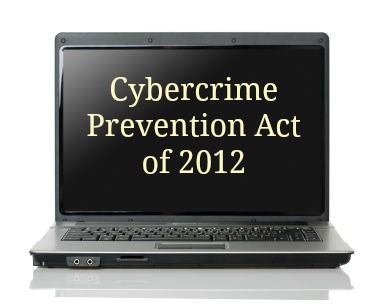On September 12, 2012, President Noynoy Aquino formally signed Cybercrime Prevention Act of 2012 (Republic Act No. 10175), which led social netizens to air their thoughts on the passing of the law.
The Cybercrime Prevention Act of 2012 clearly defines what act is considered a cybercrime and the appropriate penalties to be implemented accordingly. This law will now protect an individual and ICT industries against any offense done on cyberspace.
This law was not passed solely to protect anyone against cyberbullying. In fact, the term itself was not mentioned on content of the Act but libel — “The unlawful or prohibited acts of libel as defined in Article 355 of the Revised Penal Code, as amended, committed through a computer system or any other similar means which may be devised in the future.”
The Cybercrime Prevention Act of 2012 was passed to penalize those who commit hacking, cyber-squatting, online forgery, fraud and theft, cybersex, child pornography, and unsolicited commercial communications. See full content of Cybercrime Prevention Act of 2012 here.
The law will strengthen the industry of information and communications technology in the Philippines. But what does it suggest for the greater public who resort to their personal online spaces, which are their social network accounts, in venting out their views and opinions on matters that concern them and the society they live in?
 What does the passing of this law mean to us bloggers and social media practitioners? Before, people who write offensive things, intentionally or accidentally, about other people on their blogs and websites were unfazed because they know that they cannot be penalized because no law says they should have been so.
What does the passing of this law mean to us bloggers and social media practitioners? Before, people who write offensive things, intentionally or accidentally, about other people on their blogs and websites were unfazed because they know that they cannot be penalized because no law says they should have been so.
But now, with the inclusion of libel committed online, should bloggers and journalists be tamed in expressing their thoughts on anything that might concern their readers particularly in bashing the misconducts of public personalities such as politicians and celebrities?
The passing of the Cybercrime Prevention Act of 2012 shakes the ground of freedom of expression in this country. Do you think so?
We don’t always have to write/say offensive things online. Nobody wants to receive such bad degrading words himself but you know they exist – trolls, bashers, posers, cyberbullies – they are the harsh realities of the online world.
Of the many cons we can extract from the Cybercrime Prevention Act of 2012, there are some pros we can still derived from its implementation. Perhaps this will teach us to be more responsible social netizens and probably, may make us be more respectful and start treating each other as significant members of this opinionated society.
 WOWBatangas.com Your Source of Great News and Stories from the Province of Batangas, Philippines
WOWBatangas.com Your Source of Great News and Stories from the Province of Batangas, Philippines




One comment
Pingback: What is Cybercrime Prevention Act of 2012(Republic Act No. 10175)